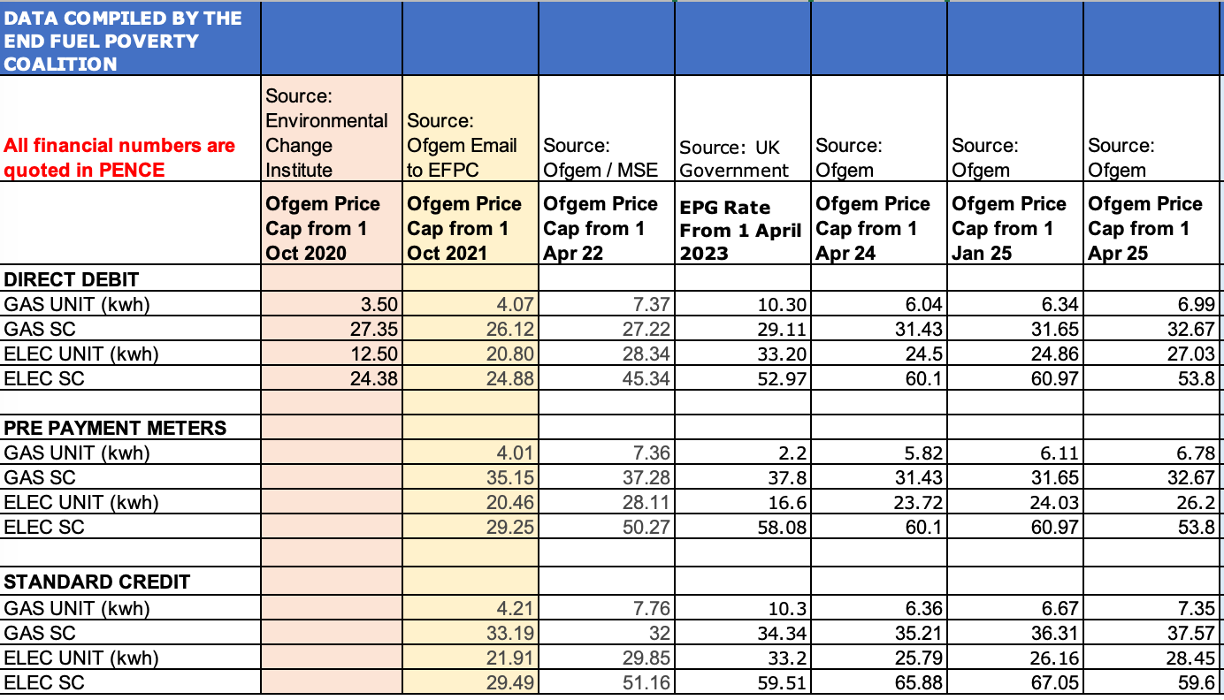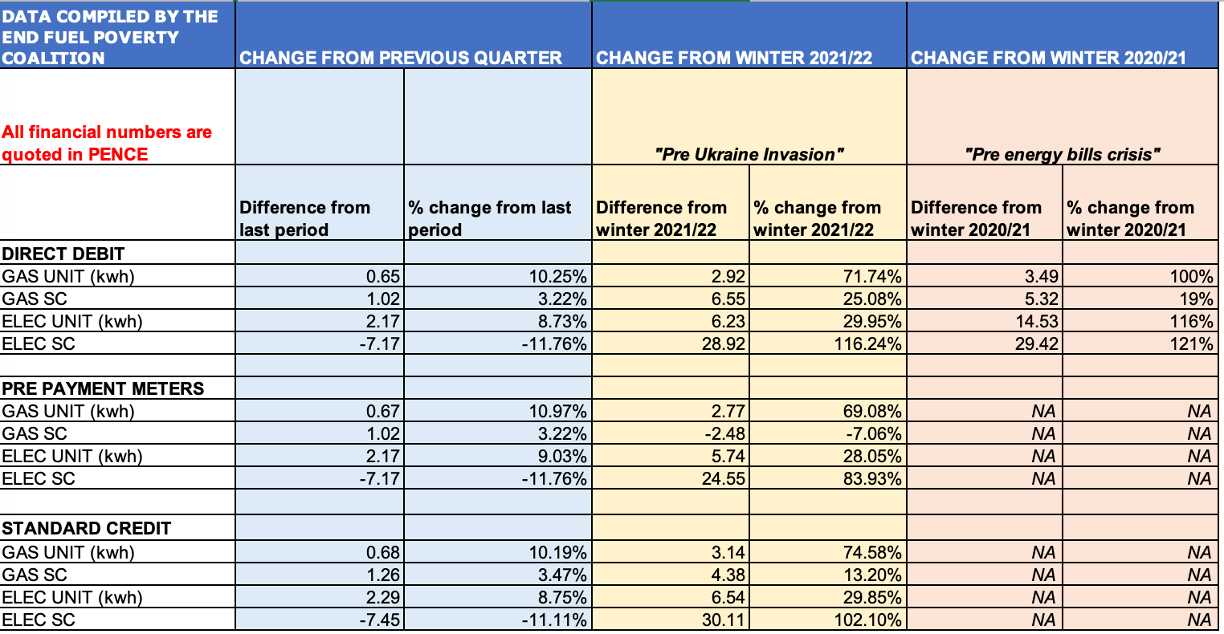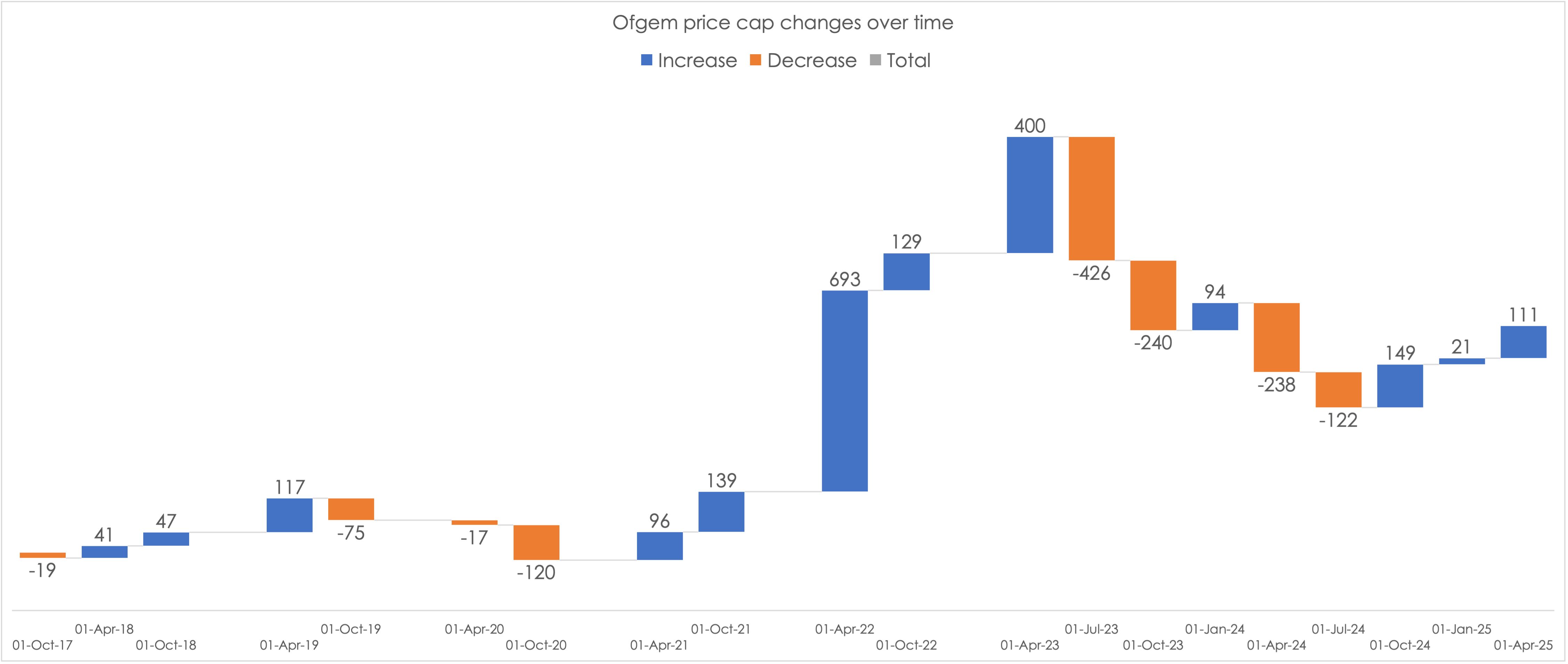From 1 January 2025, bills increased by around 1.2% to an average of £1,738 (increases of 1.3% if you are on a PPM meter and 1.7% if you have Economy 7).
From 1 April 2025, energy bills will increase further by 6.4% to an average £1,842. The next price cap change will be on 1 July 2025 and will be announced in late May 2025.
Energy bills remain at levels 77% above winter 2020/21, but people have less ability to pay these high prices after so many years of high bills and the wider cost of living crisis.
The price cap affects around 22 million customers on standard variable tariffs (SVTs), including around 4 million customers on prepayment meters (PPMs) and 5 million on Standard Credit rates (which are more expensive).
The price cap limits the unit cost of energy and standing charges which firms can charge, not the total bill. If you use more energy than average you will pay more than this figure.
Therefore it is useful to look at the cost of a unit of energy and the daily standing charge (data for winters only):

This enables us to make comparisons with previous periods:

It also enables us to calculate how much “extra” the average household has had to pay for their energy. This takes into account any Government support. For the impact on older people, scroll down the page.
| Cap change date | Average household energy bill (GBP) | Amount above GBP1,042 per household (weighted for the number of months in price cap period) |
| 01-Oct-20 | £ 1,042 | Baseline |
| 01-Apr-21 | £ 1,138 | £ 48 |
| 01-Oct-21 | £ 1,277 | £ 118 |
| 01-Apr-22 | £ 1,971 | £ 465 |
| 01-Oct-22 | £ 2,100 | £ 529 |
| 01-Apr-23 | £ 2,500 | £ 365 |
| 01-Jul-23 | £ 2,074 | £ 258 |
| 01-Oct-23 | £ 1,834 | £ 198 |
| 01-Jan-24 | £ 1,928 | £ 222 |
| 01-Apr-24 | £ 1,690 | £ 162 |
| 01-Jul-24 | £ 1,568 | £ 132 |
| 01-Oct-24 | £ 1,717 | £ 169 |
| 01-Jan-25 | £ 1,738 | £ 174 |
| TOTAL | £ 2,837 | |
| 01-Apr-25 | £ 1,849 | £ 202 |
| TOTAL | £ 3,039 |
The average household headline rate over time shows the current state of play:

The market for fixed term deals is improving, but those with high exit fees should be treated with suspicion. Customers should also exercise caution when opting for a deal with no or low standing charges as these may be passed on still via higher unit costs.
For older people, the picture is more complicated due to the changing levels of Government support.
| Winter | Average household energy bill (non-pensioner) | Average household energy bill (pensioner on highest WFP rate) | Average household energy bill (pensioner on lowest WFP rate) |
| Winter 2020/21 | £ 1,042 | £ 742 | £ 842 |
| Winter 2021/22 | £ 1,277 | £ 977 | £ 1,077 |
| Winter 2022/23 | £ 2,100 | £ 1,500 | £ 1,900 |
| Also includes Energy Bill Support Scheme, Energy Price Guarantee & Winter Fuel Payments (WFP) and Cost of Living Payments where applicable. | |||
| Winter 2023/24 (as at 1 Oct) | £ 1,834 | £ 1,234 | £ 1,634 |
| Also includes WFP Cost of Living Payments where applicable. | |||
| Winter 2024/25 (as at 1 Oct) | £ 1,717 | £ 1,717 | £ 1,717 |
As reported in the Daily Express, this means that over the coldest months of the year, the poorest pensioners who have had the Winter Fuel Payments taken away from them have had to find an extra £522 just to use the same, average household, level of energy.
Britain’s broken energy system continues to cause misery, with fuel poverty affecting many of the most vulnerable. Over 8 million adults lived in cold damp homes and official figures showed that cases of hypothermia surged and every year we see deaths caused by living in cold homes.
Other inequalities in the energy market remain with customers paying by standard credit (i.e. paying by cash, cheque or bank transfer) hit with a significant price premium.
Meanwhile some regions, such as Merseyside and North Wales will pay substantially more than others, such as those in the East Midlands.
To end the energy bills crisis, we need:
- More government help with energy bills to stop people being pushed into poverty this winter.
- Government investment in schemes to provide effective insulation and new efficient heating systems in homes to cut bills in the medium term.
- Rapidly expanding cheap, sustainable renewable energy to lower bills permanently.
- Saying “no” to new oil, gas and hydrogen for homes developments so we’re not locked into expensive fossil energy for longer than necessary.
Full Price Cap History data (End Fuel Poverty Coalition records) are available to media on request.

